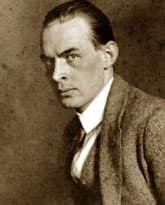Erich Maria Remarque
Critique • Works • VIEWS & QUOTES

Erich Maria Remarque, circa 1928
Born
1898, Osnabrück, Prussia, German Empire
Died
1970, Locarno, Switzerland
Places lived
Germany, Switzerland, United States
Nationality
German, American
Publications
Novels, stories, plays, essays, screenplay
Genres
Literary, war novels, romance
Writing language
German
Literature
• All Quiet on the Western Front (1929)
Novels
• All Quiet on the Western Front (1929)
German Literature
• All Quiet on the Western Front (1929)
Shaping the twentieth century
Remarque was a great and popular writer for more than four decades, but will be remembered always for his first gigantically influential novel, All Quiet on the Western Front.
When we say "influential", we don't mean only in the book's influence on other authors (although it did set the standard for writing about war in the twentieth century), but in its impact on the world's people and even on their governments. It's the one fictional work of the era that we might say has affected history. There is no telling how many readers and leaders were moved by the book to become anti-militaristic.
More importantly though, its depictions of the soul-destroying insanity of warfare have become part of our modern response to war—among those of us both for and against any particular conflict—without us necessarily realizing how we have come to absorb these attitudes.
This pervasive effect is what elevates Remarque's first novel into being an icon of the modern world above his many other worthy works.
Of French ancestry, he was born Erich Paul Remark in Osnabrück, Germany and attended the University of Münster. At eighteen he enlisted in the German Army during World War I where he was wounded five times. His experiences served as the basis of his third published novel, All Quiet on the Western Front, which follows a group of schoolmates who enter the war eagerly but find themselves in a hell they can never escape. Three film versions have been made of the novel, most notably the classic 1930 film in which the tragic ending was changed, and the harrowing most recent adaptation that adds more historical narrative.
Books burned
A sequel, The Road Back (1931, also translated as The Way Back), follows surviving soldiers of the earlier novel into chaotic, postwar Germany. It too was made into a film.
An opponent of the rising Nazis in Germany, Remarque left Germany in 1932 for Switzerland. In his homeland his books were burnt and censored and he was stripped of citizenship. In 1939 he moved to the United States and eventually became an American citizen, though he returned to Switzerland after the Second World War.
He continued to set his stories amidst postwar European upheaval. Three Comrades (1937) is a strongly anti-fascist story of three disillusioned soldiers in Germany after the first world war. A Hollywood movie based on it the next year deleted political content, such as book-burnings and anti-Semitism, to produce an inoffensive romantic story. (F. Scott Fitzgerald worked on the screenplay until it was taken away from him.)
Arch of Triumph (1946), about an embittered German refugee and an actress in Paris during the Second World War, was adapted for a film starring Charles Boyer and Ingrid Bergman in 1947, as well as a television movie in 1984. A Time to Love and a Time to Die (1947), a love-story about a German soldier on leave from the Russian front, also provided the basis for a film.
Spark of Life (1952) was a fictional documentary about life in Nazi concentration camps and The Black Obelisk (1956) was a tragicomedy, again situated in 1920s Germany.
Other notable works include a play (Full Circle, 1956), a novel (Night in Lisbon, 1964) that followed two refugees fleeing Nazism to Portugal, and Shadows in Paradise published posthumously in 1971.
Like All Quiet on the Western Front, these books won Remarque a reputation as a left-wing writer, though his works were never overtly political. He was always more interested in the human story of individuals caught up in the events of that era, Remarque said.
The novel Heaven Has No Favourites (1961) is a late exception from the postwar theme for Remarque, concerning a racing driver who falls in love with an incurably ill girl. It was filmed as Bobby Deerfield, starring Al Pacino, in 1977—years after Remarque's death.
All his novels after All Quiet on the Western Front are worth reading for their studies of humanity facing tragic situations, though only that early masterpiece reached the world-changing levels that few writers ever attain.
— Eric
Critique • Works • VIEWS & QUOTES

